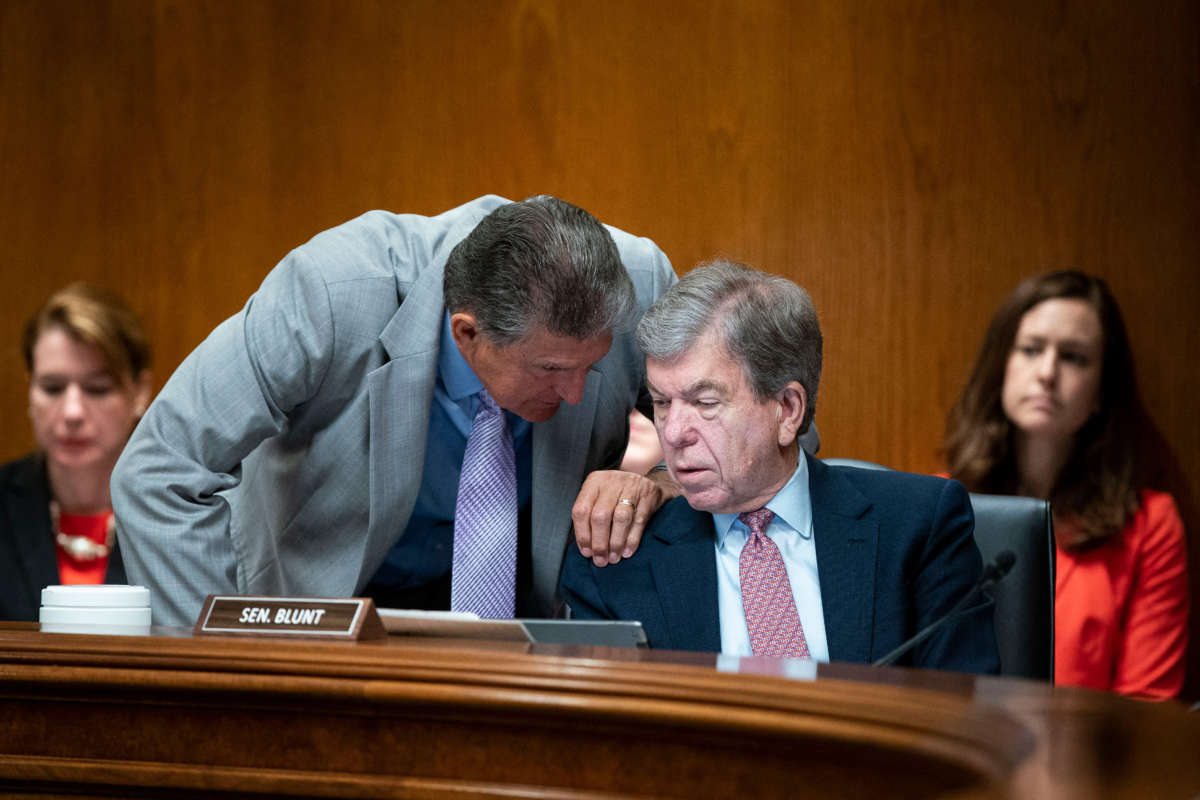Did you know that Truthout is a nonprofit and independently funded by readers like you? If you value what we do, please support our work with a donation.
In a leaked call from Monday obtained by The Intercept, filibuster supporter and voting rights waffler Sen. Joe Manchin (D-West Virginia) appears to have suggested that billionaire donors and corporate executives use their influence with the soon-to-retire Sen. Roy Blunt (R-Missouri) to get him to flip his vote against the January 6 commission.
On the call with prominent Wall Street executives and billionaire investors organized by the controversial bipartisan group No Labels, Manchin discussed the importance of the donors’ roles in getting support from Republicans for the proposal for a commission to investigate the January 6 Capitol attack.
Getting the commission passed, he said, would be proof positive that the Senate filibuster, which currently stands in the way of a wide swath of Democratic priorities, can stay. Keeping the filibuster, write The Intercept’s Lee Fang and Ryan Grim, is a priority for both Manchin and the corporate donors on the call, the latter of whom favor keeping the filibuster because “it bottles up progressive legislation that would hit their bottom lines.”
But in order to whip up more votes, Manchin told the donors that he needed their help. Manchin could flip Blunt’s no vote on the commission, he seemed to suggest, if the powerful executives and donors dangled a certain carrot in front of the Missouri senator.
“Roy Blunt is a great, just a good friend of mine, a great guy,” Manchin said. “Roy is retiring. If some of you all who might be working with Roy in his next life could tell him, that’d be nice and it’d help our country. That would be very good to get him to change his vote. And we’re going to have another vote on this thing. That’ll give me one more shot at it.”
“Regarding Blunt, Manchin appears to be suggesting — without, perhaps, quite explicitly saying so,” write Lee and Grim, “that the wealthy executives on the call could dangle future financial opportunities in front of the outgoing senator while lobbying him to change his vote.” Manchin doesn’t necessarily seem to be raising the idea of a job for Blunt, Lee and Grim clarify, but rather suggesting that the people on the call may have an influence on future job prospects for Blunt.
Manchin’s discussion with the donors exposes an interesting and perhaps highly questionable method by which donors and politicians work in cahoots to make and change policy.
The West Virginia senator’s idealized version of bipartisanship was dealt a blow last month when the bipartisan January 6 commission was shot down by Republicans. Democrats needed 10 Republican votes to advance the bill; Republicans only gave them six, despite Democratic concessions and Manchin’s last-minute Twitter plea.
The blocking of the commission was no surprise to those who have expressed skepticism about the specter of bipartisanship that Manchin so favors. It was also further proof, if the group of skepticists needed any, that bipartisanship with Republicans is no longer extant in the U.S.
But to Manchin, the blocking of the January 6 commission appears to be an opportunity to appeal to donors for help in defending the idea of bipartisanship — with the apparent goal of preserving the filibuster.
The embattled senator has recently been under fire for his ties to big political donors. Reporters recently uncovered that Koch-affiliated advocacy groups have been pushing Manchin to keep on his path of blocking Democrats, which ultimately helps Republicans achieve their goal of obstruction.
Rep. Alexandria Ocasio-Cortez (D-New York) last week said that Manchin may be “intertwined” with these dark money donors. The tactics Manchin seemed to suggest to donors on the leaked call could be seen as further evidence of his closeness with big political financial contributors.
On the call, Manchin also shared his ideas for compromise on S.1, or the For the People Act. The ideas, such as opposing no-excuse absentee voting and giving state officials more power to purge voter rolls, however, sound as if they were plucked straight out of the Republican voter-suppression handbook. And according to a document issued out of Manchin’s office this week, the senator is also supportive of stricter voter ID requirements.
Manchin has reportedly also expressed opposition to public financing laws in S.1, one of the most crucial parts of the voting rights bill that progressives have pointed out might be at the heart of Republican and centrist disapproval because of their close and toxic relationship with corporate money.
Media that fights fascism
Truthout is funded almost entirely by readers — that’s why we can speak truth to power and cut against the mainstream narrative. But independent journalists at Truthout face mounting political repression under Trump.
We rely on your support to survive McCarthyist censorship. Please make a tax-deductible one-time or monthly donation.
